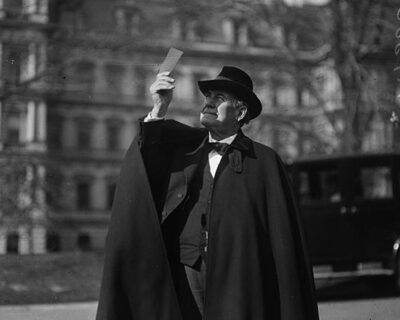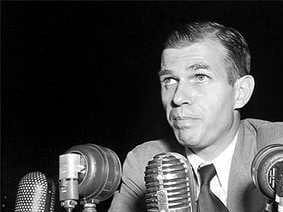
Loser Wins: William Jennings Bryan and the Legacy of Populism
History teachers rarely focus on the losers of presidential elections. Yet two men stand out as notable exceptions; Henry Clay and William Jennings Bryan. Both men were nominated for the presidency three times, both lost all three times, both impacted American politics in ways that defined their eras. Clay was a talented legislator, engineering compromises that postponed the Civil War. Bryan was a skilled orator who advocated populist and progressive policies that shaped quadrennial political debates well into the 20th century. Clay’s legacy was tempered by the failure of those compromises to prevent the Civil War. Bryan’s legacy lives on in some of the policies he embraced in his political career, including the 8-hour workday, the direct election of United States senators, and the graduated income tax. Yet high school students typically learn less about him than about Clay.
William Jennings Bryan was a devoutly religious man who adopted agrarian populism with the same degree of fervor he embraced his fundamentalist Christianity. He served two terms in the House of Representatives but lost a bid for the U.S. Senate in 1894. He remained in the public eye by writing columns for the Omaha World Herald. Bryan, despite his youth and inexperience, somehow landed the Democratic nomination for president in 1896. He embraced the populism rooted in the agrarian west and south. Farmers had been suffering for some time. Crop prices were declining, railroad rates remained high, and banks were foreclosing on family-owned farms throughout the heartland. Bryan became the voice of the farmer, railing against bigness, the bigness of railroads, the bigness of banks, and the cozy relationship these corporations enjoyed with the Republican party.
In one of the most famous speeches in American history, Bryan proclaimed his vision of a pure agrarian culture that sustained the nation, telling the 1896 Democratic convention,
“You come to us and tell us that the great cities are in favor of the gold standard; we reply that the great cities rest upon our broad and fertile prairies. Burn down your cities and leave our farms, and your cities will spring up again as if by magic; but destroy our farms, and the grass will grow in the streets of every city in the country.”
He electrified the conventioneers by concluding with an attack on the gold standard, pledging that under Democratic leadership the banks and railroads would not “crucify mankind upon a cross of gold.” The delegates leapt to their feet in a spontaneous demonstration that lasted over thirty minutes. The demonstration inspired the convention to nominate Bryan for president.
(Full disclosure: I love the “Cross of Gold” speech. My Dad bought me an album of famous American speeches when I was around 10 years old. I played Bryan’s speech over and over, proving that, in my case, history geekiness began at an early age.)
Lesser known is Bryan’s support for Woodrow Wilson in the election of 1912. Bryan had become an anti-imperialist in response to the McKinley administration’s annexation of the Philippines and espoused pacifism when Wilson named him Secretary of State. He resigned, on principle, when Wilson delivered a strong U.S. protest to the German attack on the passenger liner, Lusitania. Bryan believed Wilson was leading the nation into war and wanted no part in it.
Bryan resurfaced in Dayton, TN, in 1926 at the “Trial of the Century.” A science teacher, John Thomas Scopes, had been charged with violating Tennessee’s prohibition on teaching Charles Darwin’s account of evolution. Bryan agreed to prosecute the case after the most famous trial lawyer in America, Clarence Darrow, agreed to defend Scopes. Bryan took the stand as an expert on the Bible and suffered through Darrow’s relentless assault on Bryan’s fundamentalist views. Though ridiculed by some in the national press, Bryan lingered in Tennessee, making a few speeches. He died just five days after the trial, while still in Tennessee.
Bryan lost three national elections, 1896, 1900, and 1908. However, many of the ideas he championed became law, when embraced by the progressives of the early 1900s. These include the Federal Reserve System, banking reform, railroad regulation, the initiative and referendum, and the direct election of senators. Like an inventor whose original insights are overwhelmed by better engineering and better marketing, Bryan populist vision inspired yet was soon eclipsed by the efforts of progressive presidents in the early 20th century. Theodore Roosevelt, William Howard Taft, and Woodrow Wilson refined and adapted Bryan’s views for the industrial era. It was they who sold progressivism to the American public.



